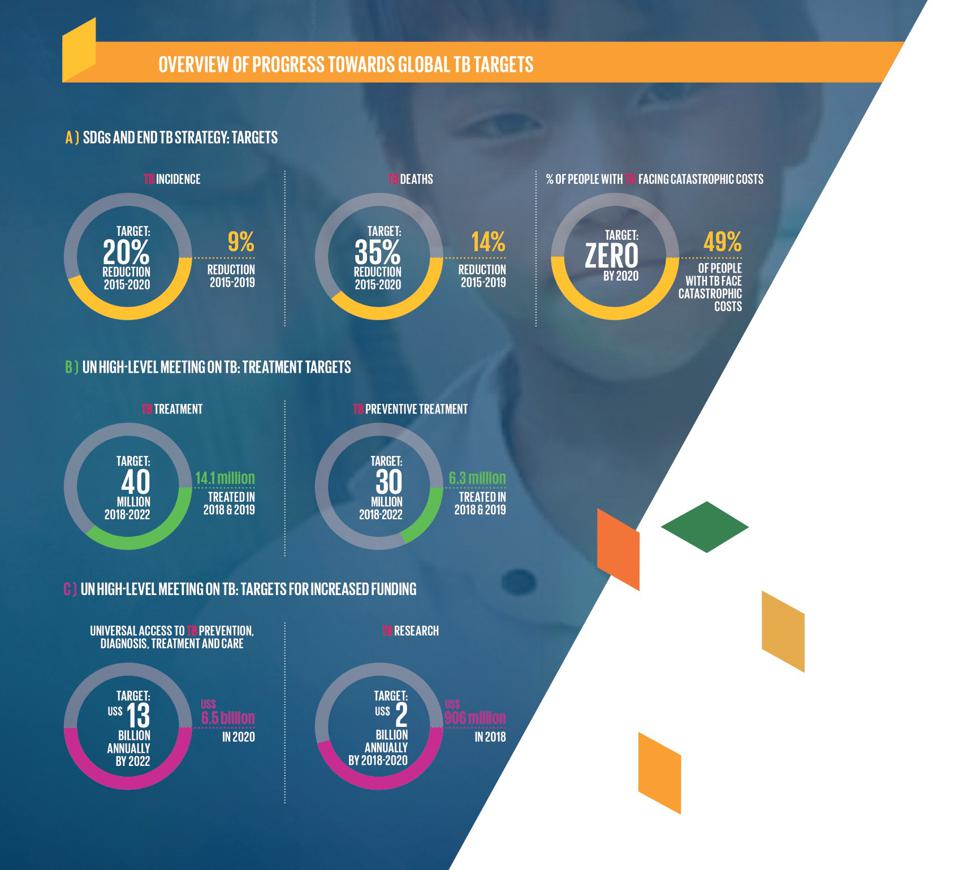WHO publishes report on the progress towards global TB targets
Last week, two years after the UN High Level Meeting (UNHLM) on Tuberculosis, the WHO and partners released a progress report to take stock of progress made in meeting the WHO’s End TB strategy, Sustainable Development Goals, and UNHLM targets for TB.
The report was released at the 75th Session UN General Assembly (UNGA) side event on September 23 and presented by WHO Director-General Dr Tedros Adhanom Ghebreyesus. He made a strong call to action, saying that “Accelerated action is urgently needed worldwide, if we are to meet our targets by 2022.”
About COVID-19's effect on TB, he added: “The COVID-19 pandemic threatens to unwind the gains we have made. The impact of the pandemic on TB services has been severe.”
Global commitments to end TB
With 1.4 million deaths and 10 million new cases in 2019, TB was the top infectious disease killer globally last year, a role it continues to hold even during COVID-19.
Three key events in the world’s fight against tuberculosis are:
- the adoption of the WHO’s End TB Strategy by all UN Member states in 2015,
- the first WHO global ministerial conference on TB (which resulted in the Moscow Declaration) in 2017, and
- the first High Level meeting on TB by the UN General Assembly in 2018 (where the assembly endorsed the Moscow Declaration's commitments to key drivers of fast progress).
A long way from reaching the End TB Strategy targets
The End TB Strategy includes targets to reduce TB incidence by 20% and reduce TB deaths by 35% between 2015 and 2020. According to the progress report TB incidents worldwide only decreased by a meagre 9% between 2015 and 2019 and TB deaths by only 14%.
Another critical target in the End TB Strategy is that no TB-affected family should face catastrophic costs due to TB. The strategy's defines catastrophic costs as total TB care costs exceeding 20% of annual household income. Last year, almost half of all people (49%) who fell ill with TB faced catastrophic costs due to their illness.

The fight against TB remains severely under-funded
The world is also behind on reaching the UNHLM’s targets for increased funding and treatment. In 2018, the GA pledged US$ 13 billion annually in funding for universal access to TB prevention, diagnosis, treatment, and care by 2022. This year, the global budget for these TB activities amounted to US$ 6.5 billion, half of the target sum. Additionally, the target to allocate US$ 2 billion annually to TB research by 2018-2020 has not been met. In 2018, only 908 million was spent on TB research globally.
At the UNGA, Ms Blessina Kumar, member of the WHO Civil Society Taskforce on TB, made a passionate call for greater investment, accountability, and research to end TB. "Invest, invest, invest", she said, and continued: “TB funding has reduced significantly, especially in the past 6-8 months, while at the same time billions of dollars have been made available for COVID-19. This is indeed great for COVID-19. But not at the cost of TB.”
The COVID-19 pandemic and TB – Impact and implications
In the context of the global TB epidemic, COVID-19 threatens to reverse recent progress towards global TB targets.
Speaking at the UNGA, Dr Tereza Kasaeva, Director of WHO’s Global TB Programme, presented a WHO analysis on the impact of COVID-19 on TB deaths. The model indicates that a 50% drop in TB case detection over three months could lead to an increase in the number of TB deaths worldwide by between 200,000 and 400,000 in 2020 alone.
Earlier this month, several civil society organisations working on TB released the results of a large survey done to document the impact of the pandemic on TB care, research, and funding. The document shows that an increase of 200,000 deaths would take the world back to 2015 levels and an increase of 400,000 to 2012 levels.
10 priorities to put the world on track to reach global TB targets by 2022
Efforts to end TB are off track and were so even before COVID-19. To get back on track, WHO and partners are urging countries to implement the following ten priority recommendations to put the world on track to reach agreed targets by 2022 and beyond:
- Fully activate high-level leadership to urgently reduce TB deaths and drive multisectoral action to end TB
- Urgently increase funding for essential TB services including for the health workforce
- Advance universal health coverage to ensure all people with TB have access to affordable quality care and resolve under-reporting challenges
- Address the drug-resistant TB crisis to close persistent gaps in care
- Dramatically scale up provision of TB preventive treatment
- Promote human rights and combat stigma and discrimination
- Ensure meaningful engagement of civil society, communities and people affected by TB
- Substantially increase investments in TB research to drive technological breakthroughs and rapid uptake of innovations
- Ensure that TB prevention and care are safeguarded in the context of COVID-19 and other emerging threats
- Request WHO to continue to provide global leadership for the TB response, working in close collaboration with Member States and other stakeholders, including to prepare for a High-Level Meeting on TB in 2023
Overall, the progress report shows that although progress continues to be made, at the current pace of progress it remains unlikely that 2035 targets will be met. Much more intensive efforts to find, cure, and prevent all cases of TB are necessary to meet global targets and end the public health burden of TB.
The 2020 Progress Report will inform a comprehensive review at a High Level Meeting on TB in 2023.
